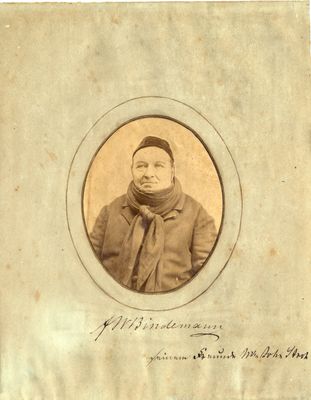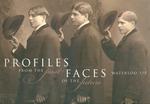Reverend Friedrich W. Bindemann
Reverend F. W. Bindemann, known as the “pale horse pastor,” was a
rugged individualist who came to Waterloo riding a magnificent white
horse and carrying the radical message that all people are equal in the
eyes of God, whether they believe or not.
This message so shocked the good people of St. John’s Lutheran
Church that they rejected him in 1841, just three years after he had
founded the Waterloo congregation.
St. John’s was not the first group to reject this Reformed Church pastor, who was born in Prussia in 1790. In 1838, the Lutheran congregation of St. Peter’s in Preston kicked him out for preaching his rationalist and universalist doctrine.
It was the mid-eighteenth century and Bindemann, the son of a Reformed Church pastor, was preaching that God could be merciful even to disbelievers. He denied the doctrines of the Trinity, the deity of Christ and Original Sin.
Although he worked mostly among Lutherans and founded four other Lutheran churches in Berlin (Kitchener), New Hamburg, Conestogo and Phillipsburg, only St. Paul’s Church in Berlin kept him on as parson after he made a few concessions to the approved doctrines of the church.
Bindemann remained at St. Paul’s for more than thirty years and became known as the “marrying pastor.” He married more than 2,000 couples with a humorous and informal ceremony. One often repeated story involves eight new couples who gathered in his living room to be married. Bindemann approached each couple one-by-one, saying:
“You want each other. You got each other. Two dollars.”
It’s estimated that more than 500,000 living today can trace their ancestry to couples that were married in Waterloo County by Bindemann.
Bindemann was brought up not far from Berlin, Germany in what was known as the kingdom of Prussia. He served in the Prussian army as a volunteer rifleman before receiving an honourable discharge and immigrating to America in 1820 as a missionary of the Evangelical Protestant Church.
He settled in Pennsylvania before coming to Waterloo County in 1834. He brought his bride, Louise Huber who was an excellent singer, and soon settled into a house directly across the street from Kitchener-Waterloo Collegiate. Their home became a cultural centre where young people would gather in the evenings.
Bindemann was also known for his quick tongue. On a visit to Bridgeport the new magistrate Peter N. Tagge asked Bindemann how he could justify riding such a majestic white horse when the Lord was content with an ass.
Reverend Bindemann is said to have replied: “We can’t do that anymore, for all the asses have been made magistrates.”
Photo courtesy of the Waterloo Historical Society.
Reverend Friedrich W. Bindemann (Waterloo 150 Profile)
Description
- Creator
- Gallagher, Beth, Author
- Media Type
- Text
- Image
- Description
- To celebrate Waterloo's 150th anniversary, the Waterloo Public Library published a book called "Profiles from the Past, Faces of the Future." This book featured 150 profiles of people who helped make Waterloo what it is today. This is the digitized profile for Friedrich W. Bindemann.
- Notes
- Please visit the Waterloo Public Library to enquire about physical copies of "Profiles from the Past, Faces of the Future."
The Waterloo 150 project was funded by a grant from the Waterloo Regional Heritage Foundation. Beth Gallagher wrote the profiles with the assistance of many research volunteers. Information for the profiles was gathered from a variety of sources from the community and the Ellis Little Local History Room. Notable sources include the Ellis Little Papers, newspaper clippings, local magazines and books. - Place of Publication
- Waterloo, Ontario
- Date of Publication
- 2007
- Subject(s)
- Personal Name(s)
- Bindemann, Friedrich ; Huber, Louise ; Tagge, Peter
- Language of Item
- English
- Geographic Coverage
-
-
Ontario, Canada
Latitude: 43.4668 Longitude: -80.51639
-
- Copyright Statement
- Uses other than research or private study require the permission of the rightsholder(s). Responsibility for obtaining permissions and for any use rests exclusively with the user.
- Contact
- Waterloo Public LibraryEmail:askus@wpl.ca
Website:
Agency street/mail address:35 Albert Street, Waterloo, Ontario, Canada, N2L 5E2
- Full Text




